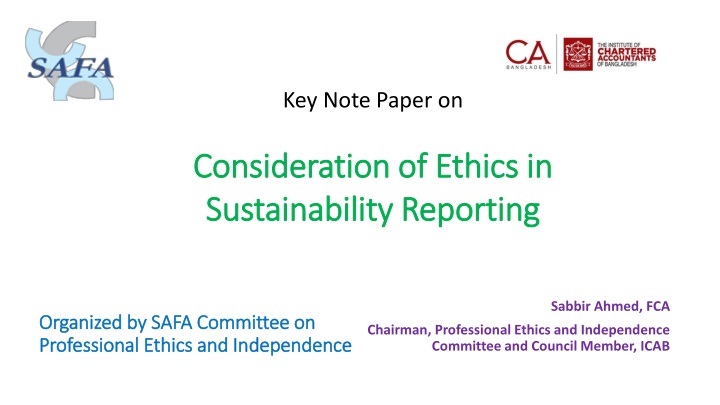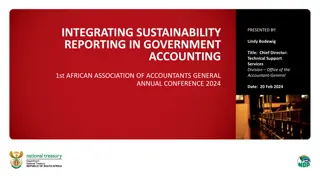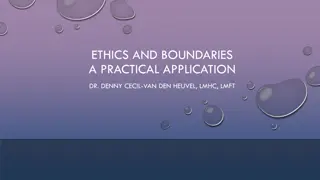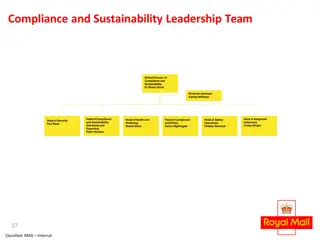Ethics in Sustainability Reporting: Evolution and Importance
Investors today seek sustainability information to understand long-term value creation. Sustainability reporting helps build trust, transparency, manage risks, and comply with regulations. Learn about stakeholders, evolution of reporting standards, and the role of organizations like GRI and IIRC.
Download Presentation

Please find below an Image/Link to download the presentation.
The content on the website is provided AS IS for your information and personal use only. It may not be sold, licensed, or shared on other websites without obtaining consent from the author.If you encounter any issues during the download, it is possible that the publisher has removed the file from their server.
You are allowed to download the files provided on this website for personal or commercial use, subject to the condition that they are used lawfully. All files are the property of their respective owners.
The content on the website is provided AS IS for your information and personal use only. It may not be sold, licensed, or shared on other websites without obtaining consent from the author.
E N D
Presentation Transcript
Key Note Paper on Consideration of Ethics in Consideration of Ethics in Sustainability Reporting Sustainability Reporting Sabbir Ahmed, FCA Organized by SAFA Committee on Organized by SAFA Committee on Professional Ethics and Independence Professional Ethics and Independence Chairman, Professional Ethics and Independence Committee and Council Member, ICAB
Why Sustainability Reporting is needed In recent years, investors have been increasingly focused on information that provides a better understanding of a company s long-term value creation and enables them to allocate capital to businesses they perceive as being more sustainable. Financial markets have seen accelerated growth in the disclosure of sustainability information. More importantly, stakeholders not only want to see what you have achieved, they also want to know how you achieved. Stakeholders expectation Building trust and confidence on business Bringing transparency Managing risk and creating resilience Enhance corporate value Compliance with regulation
Stakeholders of sustainability reporting Government and regulators Investors and capital market Civil society, NGOs, public Stakeholders of sustainability reporting Employees and suppliers Customers and clients Financiers
Evolution of Sustainability Reporting 2001-2010 Global Reporting Initiative (GRI) Other Regional Forums IIRC SASB UN SDGs IOSCO-SFN WEF-IBC Carbon Disclosure Greenhouse Gas Climate Disclosure Pre 2000 2010-2020
Evolution of Sustainability Reporting Evolution of Sustainability Reporting Global Reporting Initiative (GRI) Established in 1997, GRI is the independent, international organization that helps businesses and other organizations to take responsibility for their impacts by providing them with the global common language to communicate those impacts. The International Integrated Reporting Council (IIRC) The International Integrated Reporting Council (IIRC) was established in 2010 as a global coalition of businesses, investors, policy-makers, the accounting profession and civil society. The IIRC Board of Directors oversaw the strategy, finances, and operations of the organization and appointing members of the International Integrated Reporting Framework Board. The International Integrated Reporting Framework Board recommended any revision, modification or other updates to the International Integrated Reporting Framework. The Council was the primary institutional forum for expression of the broad market view on matters relating to integrated reporting and integrating thinking, as well as a medium for its interaction and provision of advice, guidance and input on issues of relevance for the organization, including its nature, objectives, purpose, vision and mission, as well as its strategy and the means by which to deliver it.
Evolution of Sustainability Reporting Evolution of Sustainability Reporting The Sustainability Accounting Standards Board (SASB) The Sustainability Accounting Standards Board (SASB) was founded in 2011 as a not-for-profit, independent standards-setting organization. SASB s mission was to establish and maintain industry-specific standards that assist companies in disclosing financially material, decision-useful sustainability information to investors. In 2017, SASB transitioned to a two-tier governance structure. This structure included a board of directors ( the SASB Foundation Board ) and a standards-setting board ( the SASB Standards Board ). The SASB Standards Board developed, issued, and maintained the SASB Standards. The SASB Foundation Board oversaw the strategy, finances, and operations of the organization, and appointed the members of the SASB Standards Board. The Value Reporting Foundation (VRF) In 2021, the IIRC merged with the SASB Foundation into the Value Reporting Foundation (VRF). The IIRC Board of Directors and the SASB Foundation Board of Directors combined to form the Value Reporting Foundation Board of Directors ( the VRF Board ). A governing board, the VRF Board was responsible for overseeing the strategy, finances, and operations of the organization and appointing members of the International Integrated Reporting Framework Board/the SASB Standards Board.
Evolution of Sustainability Reporting Evolution of Sustainability Reporting On 3 November 2021, the IFRS Foundation Trustees announced the creation of a new standard-setting board the International Sustainability Standards Board (ISSB) to develop a comprehensive global baseline of high-quality sustainability disclosure standards to meet investors information needs. The IFRS Foundation also announced plans to consolidate with the Value Reporting Foundation and the Carbon Disclosure Standards Board (CDSB). Effective August 1, 2022, the Value Reporting Foundation home to the SASB Standards consolidated into the IFRS Foundation, which established the first International Sustainability Standards Board (ISSB). SASB Standards are now under the oversight of the ISSB. The intention is for the ISSB to deliver a comprehensive global baseline of sustainability-related disclosure standards that provide investors and other capital market participants with information about companies sustainability-related risks and opportunities to help them make informed decisions. Subsequently, on 1 November 2022, the IFRS Foundation Trustees have announced a new advisory group named The Integrated Reporting and Connectivity Council (IRCC). The Integrated Reporting and Connectivity Council (IRCC) is an advisory body to the IFRS Foundation Trustees, the International Accounting Standards Board (IASB) and the International Sustainability Standards Board (ISSB).
Independent Assurance on Sustainability Reporting Independent Assurance on Sustainability Reporting So far the focus has been mainly on Sustainability Reporting. However, off late demands are also being created for independent assurance on sustainability reporting. For example, the International Organization of Securities Commissions (IOSCO) has engaged with different stakeholder groups; investors, issuers, assurance providers, and standard setters across different regions and encouraged standard-setters to work on assurance of sustainability related reporting. In particular, IOSCO encouraged the IAASB and the IESBA Boards to work with others in the ecosystem to support capacity-building by providing support and guidance including using robust methodologies and rigorous risk assessment processes. Other key messages emerged from these IOSCO sessions are as follows: Among investors, there is growing demand for assurance to enhance the reliability of corporate sustainability reporting. While limited assurance may be the most realistic objective in the short term, investors typically see reasonable assurance as the long- term target, especially in respect of metrics such as those related to greenhouse gas emissions. Issuers also expressed a need for assurance standards that are effective in the current landscape of sustainability reporting and are capable of keeping up with evolving standards and practices. Investors and issuers also see consistent and comparable assurance standards for sustainability-related information as key to supporting high-quality assurance engagements.
Specific issues in sustainability reporting Specific issues in sustainability reporting In October 2018, IOSCO established its Sustainable Finance Network (SFN) to provide a forum for members to exchange experiences and gain a better understanding of, and have structured discussions on, various sustainability issues. The SFN has analysed the context in which securities regulators are addressing sustainability efforts, the roles they can play and the challenges they may face. SFN s findings highlighted three recurring themes, namely multiple and diverse sustainability frameworks and standards, including sustainability-related disclosure; a lack of common definitions of sustainable activities; and greenwashing and other challenges to investor protection. Greenwashing usually refers to practices aimed to mislead intended user of the information or intentionally giving them a false impression about how well an entity or an investment is aligned with its sustainability goals. For example, an investor in sustainable finance consider the process of incorporating economic, social, and environmental (ESG) factors into financial decision-making. Examples of greenwashing in this context can include an over-emphasis of ESG considerations in the communication of a product or instrument and in corporate information to target investor in sustainable finance, where such considerations have had a very limited impact on the actual investment or business strategy being implemented.
Ethical consideration and IESBA involvement Ethical consideration and IESBA involvement Ethics and independence plays very important role in the collection, reporting and assurance of sustainability information. Accordingly, the IESBA has taken steps to develop fit-for-purpose, globally applicable ethics and independence standards as a critical part of the regulatory infrastructure to support transparent, relevant and trustworthy sustainability reporting. The IESBA s strategic commitment is to set up the International Code of Ethics for Professional Accountants (including International Independence Standards) ( theCode or the Code of Ethics )as ISSB Reporting IAASB Assurance the third pillar to trustworthy sustainability reporting and assurance, alongside the standards being developed by the International Sustainability Standards Board (ISSB) and the International Auditing and Assurance Standards Board (IAASB). IESBA IESBA Ethics It is worthwhile to note that in comparison to financial reporting, Independence sustainability-related reporting typically involves a more extensive narrative component, more forward-looking information, and more reliance on information pertaining to the issuer s value chain, which may be outside of the issuer s internal controls. It may also be disclosed in different formats and across different documents.
Ethical consideration and IESBA involvement Ethical consideration and IESBA involvement As per the published IESBA Update in December 2022, the IESBA approved two new projects that will deliver the following: Sustainability Project Profession-agnostic independence standards for use by all sustainability assurance practitioners Specific ethics provisions relevant to sustainability reporting and assurance Experts Project Specific ethics and independence provisions addressing the use of experts by organizations as well as in the context of audit and assurance engagements (including sustainability assurance). The projects will be carried forward by two separate task forces; the Sustainability Task Force and the Experts Task Force. The Sustainability Task Force will in turn have two workstreams: Workstream 1 will focus on the independence issues relating to sustainability assurance; and Workstream 2 will focus on the ethics issues relating to both sustainability reporting and assurance. The IESBA has also established a Sustainability Coordination Committee (SCC) which will be responsible for overseeing the coordination of the work on the Sustainability project and between the Sustainability and Experts projects.
The Conceptual Framework The Conceptual Framework Integrity Objectivity Professional competence and due care Confidentiality Professional behaviors Five Fundamental Principles Identifying Threats Evaluating Threats Addressing Threats Independence of mind Independence in appearance Independence
Why professional accountants can play an important role Why professional accountants can play an important role The accountancy profession plays a major role in the sustainability reporting supply chain. The profession brings to this domain its wide and deep competencies in the preparation and presentation of information and the provision of assurance thereon. The profession has historically demonstrated wide and deep technical competencies and a strong ethical core in preparing, presenting, and assuring financial information. Similarly, those attributes are invaluable in reporting on non-financial information such as information related to sustainability. Most importantly, public trust in the profession in those crucial roles for sustainability is underpinned by robust global ethics standards, which in turn contribute to confidence in sustainability reporting. Misleading sustainability reporting (e.g. greenwashing) covers more specifically a range of behaviors, from omitting information to misrepresenting or falsifying it with the intent to mislead investors and other users. In some cases, greenwashing might result in non-compliance with laws and regulations. Professional accountants by following the Code can ensure integrity of sustainability reporting.
Specific ethical issues: IESBA Staff questions & Answers Specific ethical issues: IESBA Staff questions & Answers There are several ethics-related challenges arising from professional accountants' involvement in sustainability reporting and assurance, especially circumstances related to misleading or false sustainability information (i.e., "greenwashing"). The International Code of Ethics for Professional Accountants (including International Independence Standards) ( theCode or the Code of Ethics )requires professional accountants not to be associated with misleading information. The Code also establishes a responsibility for professional accountants to act in the public interest. Intentionally misleading investors and other users of sustainability information would constitute a breach of the fundamental principle of integrity and could be fraudulent. In addition, threats to compliance with the fundamental principles of objectivity, professional competence and due care, and professional behavior might also be created. Accordingly, in October 2022, the IESBA has published a Staff Questions & Answers to highlight the relevance and applicability of the Code in certain specific issues and circumstances. Most critical elements from that publication are reproduced and discussed in the following slides.
Specific ethical issues: IESBA Staff questions & Answers Specific ethical issues: IESBA Staff questions & Answers Q: Do professional accountants have to comply with the Code s provisions when preparing and presenting not only financial, but also non-financial information, including sustainability information A: Yes. The Code specifies that a distinguishing mark of the accountancy profession is its acceptance of the responsibility to act in the public interest. Confidence in the profession is a reason why businesses, governments and other organizations involve professional accountants in a broad range of areas, including financial and corporate reporting, assurance and other professional activities (paragraphs 100.1 and 100.2). Accountants understand and acknowledge that such confidence is based on the skills and values that they bring to their professional activities, including: (paragraph 100.2) (a) Adherence to ethical principles and professional standards; (b) Use of business acumen; (c) Application of expertise on technical and other matters; and (d) Exercise of professional judgment. Irrespective of the nature of the professional activity and the skills and knowledge necessary to perform such activity, a professional accountant must comply with the Code s provisions and act in the public interest.
Specific ethical issues: IESBA Staff questions & Answers Specific ethical issues: IESBA Staff questions & Answers Q: Are there specific provisions in the Code that safeguard against greenwashing? A: Yes. Complying with the fundamental principles, in particular integrity, plays an important role in avoiding practices that could lead to greenwashing. For example, professional accountants who comply with the principle of integrity are straightforward and honest in all professional and business relationships, and refrain from being associated with sustainability reports, returns, communications or other information where the accountant believes that the information: Contains a materially false or misleading statement; Contains statements or information provided recklessly; or Omits or obscures required information where such omission or obscurity would be misleading. When a professional accountant becomes aware of having been associated with materially false or misleading sustainability information, there is an obligation under the Code for the accountant to take steps to be disassociated from that information. This requirement applies even in difficult situations, or when the professional accountant feels pressured to do otherwise.
Specific ethical issues: IESBA Staff questions & Answers Specific ethical issues: IESBA Staff questions & Answers Q: The multiplicity of reporting frameworks may result in inconsistent approaches to reporting on sustainability information. Does the Code require compliance with a specific reporting framework when professional accountants prepare and present sustainability information? A. Pursuant to paragraph R220.4, the Code requires professional accountants to prepare and present sustainability information in accordance with the relevant reporting framework, where applicable. However, when no sustainability reporting framework is applicable or available, the Code requires the professional accountant to exercise professional judgment to identify and consider: The purpose for which the sustainability information is to be used; The context within which it is given; and The audience to whom it is addressed. The Code recognizes that preparing or presenting information might require the exercise of discretion in making professional judgments. For example, this might involve selecting disclosures about risks under the applicable sustainability reporting framework. The Code is clear that in making judgments, professional accountants must not exercise discretion with the intention of misleading others or influencing contractual or regulatory outcomes inappropriately.
Specific ethical issues: IESBA Staff questions & Answers Specific ethical issues: IESBA Staff questions & Answers Q: Sustainability-related terms are constantly emerging, resulting in different definitions across jurisdictions. There is a lack of common understanding or transparency, for example, about what is meant by sustainableinvestment and sustainability risks. The descriptors for sustainability performance metrics (e.g., green or ethical ) are not yet standardized or defined. These inconsistencies present challenges in providing transparent and reliable sustainability information. What guidance does the Code provide to address this matter? A. The Code does not explicitly deal with this matter. However, the overarching requirements, including the fundamental principles and the conceptual framework, apply. Application of the conceptual framework would lead the professional accountant to exercise professional judgment and use the reasonable and informed third-party test in deciding on which terms are fit for purpose. In the case of the preparation and presentation of sustainability information, the Code calls for professional accountants to exercise professional judgment to describe clearly the true nature of the underlying business transaction or activity (paragraph R220.4 (c)). In exercising judgments about the appropriate term to use in a sustainability report, it is relevant to consider the purpose, context, and audience of the report.
Specific ethical issues: IESBA Staff questions & Answers Q: Making misleading or inaccurate claims about the sustainability performance of an investment without providing evidence for the claims is another form of greenwashing. Does the professional accountant have any responsibility to verify the sustainability information or performance? A. Yes. The application of the conceptual framework calls for professional accountants not to accept the sustainability information at face-value the Code requires them to have an inquiring mind (paragraph R120.5(a)). This involves: (paragraph 120.5 A1) (a) Considering the source, relevance and sufficiency of the information obtained, taking into account the nature, scope and outputs of the professional activity being undertaken; and (b) Being open and alert to a need for further investigation or other action. The Code provides guidance to assist professional accountants in considering the source, relevance and sufficiency of information obtained. In applying an inquiring mind, professional accountants should consider whether the sustainability information presented is substantiated.
Specific ethical issues: IESBA Staff questions & Answers Specific ethical issues: IESBA Staff questions & Answers Q: ESG metrics can be broadly categorized as point in time measurements. Different timing of measurement and disclosure of ESG data can lead to inconsistency in the presentation of the information and make it difficult to compare advancement in ESG goals. Does the Code provide guidance in relation to the timing of the measurement or disclosure of sustainability information? A: The Code does not specify the point in time at which ESG measurements should be taken or disclosed, or how often to do so. However, when preparing and presenting sustainability information, including ESG data, the Code requires that a professional accountant exercise professional judgment to classify and record the information in a timely and proper manner (para R220.4 (c)). Furthermore, when there is no relevant reporting framework, preparing or presenting sustainability information might require the exercise of discretion in making professional judgment. The Code prohibits a professional accountant from exercising discretion with the intention of misleading others or influencing contractual or regulatory outcomes inappropriately (paragraph R220.5). Consequently, professional accountants should not choose the timing of disclosure of the sustainability data to achieve a more favorable presentation or better outcome.
Specific ethical issues: IESBA Staff questions & Answers Q: There is a great deal of pressure to meet ESG goals in the current environment. There are also many incentives and opportunities to cherry-pick or greenwash ESG related information. Does the Code provide guidance on how to deal with such pressure? A. The Code requires that a professional accountant comply with the principle of integrity. Integrity involves fair dealing, truthfulness and having the strength of character to act appropriately, even when facing pressure to do otherwise or when doing so might create potential adverse personal or organizational consequences. Q: Suppose a professional accountant prepared a sustainability report and subsequently learns that information in that report is misleading. In investigating the matter, the professional accountant also obtains information that suggests there has been non- compliance with a particular law or regulation. What is the professional accountant s responsibility under the Code? A: When a professional accountant knows, or has reason to believe, that the sustainability information they are associated with is misleading, the Code requires the accountant to take appropriate actions to seek to resolve the matter (paragraph R220.8).























